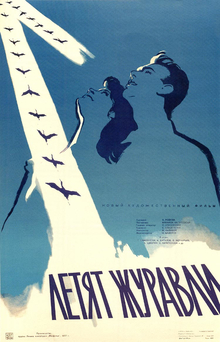The Russian people have suffered more than most under the Second World War and this is well represented on film. The Cranes are Flying is one of the earliest and most well known such efforts. Unfortunately while there is a lot of emotive power in the simplicity of this drama, it is a very traditional and old-fashioned film and as such feels to me more like a sort of prototype in what it is trying to achieve that has since been superseded by other films. It’s also a little too obviously nationalistic propaganda for my tastes.
Veronika and Boris are sweethearts and everyone around them knows that they are meant to be together, except for Boris’ cousin Mark who lives with them and wants Veronika for himself. When Germany invades the Soviet Union, the heroic Boris immediately volunteers to serve on the frontlines but Mark who is musically talented receives an exemption. Veronika is resolved to wait for Boris but when she and Mark are alone during an air raid, Mark rapes her, forcing her to marry him. Boris’s family thinks that she is unfaithful and despises her for it. Boris fails to send any message home even as the whole family is forced to flee the German advance to Siberia. Veronika works as a nurse in the hospital and tries to make the best of her marriage even as she loves Boris but the cowardly and manipulative Mark naturally makes for a terrible husband.
This is rather short film that serves as an exceedingly old-fashioned and straightforward parable. It actually feels too short to me as so much time passes and so much happens offscreen in between scenes. The film goes all the way from peacetime before the invasion to the end of the Second World War in a very abbreviated fashion with only some very brief battle scenes. The focus is entirely on the character of Veronika and it’s obvious that the intent here is to forge a kind of heroic national icon to represent the women of the Soviet Union. I can’t get behind the sentiment that women need to do their part and wait patiently for the men who go off to war but it’s an understandable sentiment for the era. I note however that while this film did succeed in turning the lead actress Tatiana Samoilova into a sort of national heroine, the Soviet Union still failed her by forbidding her to take any roles in foreign film and letting her die in poverty.
The flying cranes here are used as poetic imagery for peace but it has no real emotional resonance for me. I also feel that the film is oddly forgiving towards Mark. Granted he is family, but he did rape Veronika and he did actively try to avoid serving as a soldier. I would have thought that a film that leans so heavily into the nationalistic angle would delight in having him face more serious repercussions for his actions. Anyway this film isn’t really about general suffering during the war. It’s really about how it breaks apart families and especially tear lovers apart. I suppose I like the theme that each soldier who dies leaves behind people who loved him and misses him. But plenty of other films do this too without the propaganda. As it is this one is underwhelming once you have seen Come and See so I can’t really recommend watching it beyond some historical interest in Soviet films of that era.

One thought on “The Cranes are Flying (1957)”